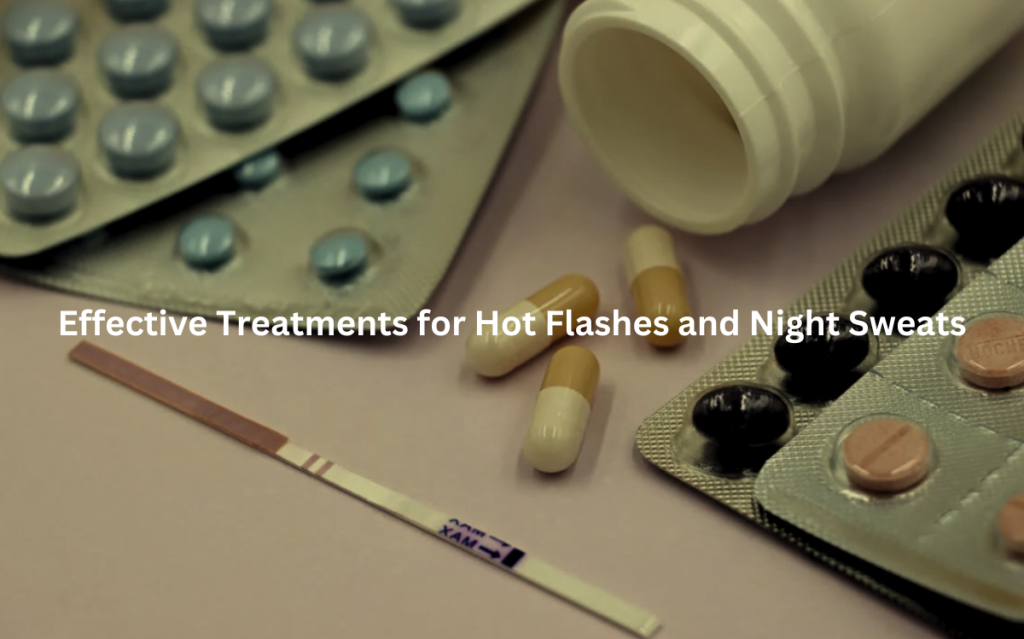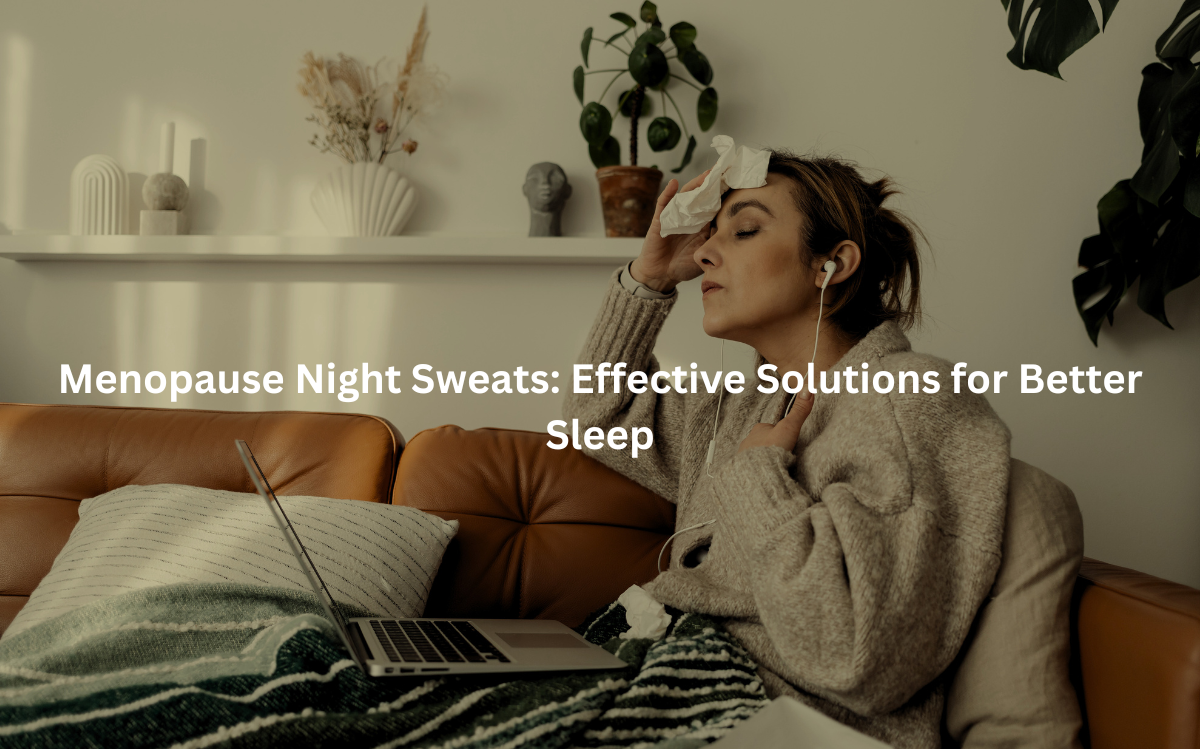Struggling with menopause night sweats? Learn practical treatments and lifestyle changes to find relief.
Menopause night sweats are a common and disruptive symptom of hormonal changes. As estrogen levels fluctuate, many women experience hot flashes and night sweats that can impact sleep and overall well-being.
Fortunately, there are various treatment options, lifestyle adjustments, and remedies that can help alleviate these symptoms. (1)
Key Takeaways
- Hormone Replacement Therapy (HRT) and non-hormonal treatments are effective for managing night sweats.
- Lifestyle changes, including diet and exercise, can significantly reduce the severity of hot flashes and night sweats.
- Alternative remedies like herbal supplements and mindfulness practices offer additional relief for menopause symptoms.
What is Menopause and What Causes Night Sweats?
Menopause is a natural phase in a woman’s life, marking the end of her menstrual cycle, typically occurring between the ages of 45 and 55.
This transition is characterized by a series of hormonal shifts, with a significant decrease in estrogen production from the ovaries.
It’s these hormonal changes that lead to common symptoms like hot flashes, night sweats, mood swings, and irregular periods. Night sweats, in particular, can be one of the most disruptive symptoms, often interrupting sleep and leading to fatigue and discomfort.
The root cause of night sweats lies in the fluctuating estrogen levels. Estrogen is responsible for regulating body temperature, and as it declines, the body becomes less efficient at maintaining a stable temperature. The result? Hot flashes and night sweats.
During a hot flash, blood vessels near the skin dilate, causing a sudden feeling of intense heat. This can often be followed by sweating, leaving the person feeling uncomfortable. When these episodes happen during sleep, they can lead to night sweats, waking the individual up in a sweat-soaked bed.
Effective Treatments for Hot Flashes and Night Sweats

Hormone Replacement Therapy (HRT): Benefits and Types
Hormone Replacement Therapy (HRT) remains the gold standard for treating menopause-related symptoms, including hot flashes and night sweats. (2)
HRT works by replacing the estrogen that the body is no longer producing, effectively alleviating the symptoms associated with menopause. There are several types of HRT, each tailored to different needs and preferences.
- Oral HRT: The most common form of HRT, typically taken in pill form. It’s convenient, but it can have side effects like bloating or nausea in some women.
- Transdermal HRT: This form is absorbed through the skin via patches, gels, or sprays. It’s often recommended for women who are at a higher risk of blood clots, as it bypasses the liver and has fewer side effects.
- Vaginal HRT: For women who experience urogenital symptoms such as vaginal dryness and urinary issues, vaginal estrogen (in the form of creams, tablets, or rings) can be very effective without significantly affecting the rest of the body.
Each form of HRT has its own advantages and risks, so it’s important for women to work closely with their healthcare provider to determine which option is best suited to their health profile.
Non-hormonal Options
For women who cannot take HRT or prefer not to, there are non-hormonal treatments available. While they might not be as effective as estrogen-based therapies, they can still provide relief from hot flashes and night sweats. Some options include:
- SSRIs and SNRIs: These are antidepressants that have been found to help reduce the frequency and severity of hot flashes. While not designed specifically for menopause, they can be a good option for women who experience both hot flashes and mood swings.
- Gabapentin: Originally used for nerve pain, gabapentin has shown promise in reducing hot flashes. It works by affecting the nervous system and reducing the intensity of heat episodes.
- Clonidine: A medication primarily used for high blood pressure, clonidine can help control hot flashes by stabilizing blood vessel dilation.
Cognitive Behavioral Therapy (CBT)
Cognitive Behavioral Therapy (CBT) is a type of talk therapy that helps people manage stress, anxiety, and other emotional challenges.
In the context of menopause, CBT can be particularly effective in managing the emotional side effects of hot flashes and night sweats. It doesn’t directly treat the physical symptoms but helps women develop coping strategies to deal with the stress and sleep disruption caused by these symptoms.
Lifestyle Changes to Alleviate Symptoms
While medical treatments are often necessary, lifestyle changes can also play a significant role in managing menopause symptoms, including hot flashes and night sweats.
The Importance of Regular Exercise and a Balanced Diet
Exercise helps regulate body temperature, improve mood, and reduce stress. It’s important for menopausal women to engage in both aerobic exercise (like walking, swimming, or cycling) and strength training. Strength training is especially important because it helps prevent the loss of bone mass, which can be accelerated during menopause.
A balanced diet is equally important. Eating foods rich in calcium and vitamin D supports bone health, while omega-3 fatty acids (found in fish and flaxseeds) can help reduce inflammation. Additionally, keeping weight in check can help minimize hot flashes, as excess weight can exacerbate symptoms.
Foods to Avoid
Certain foods and beverages can trigger or worsen hot flashes and night sweats. These include:
- Caffeine: A stimulant that can increase body temperature and trigger hot flashes.
- Alcohol: Can dilate blood vessels and cause hot flashes.
- Spicy foods: Often lead to a rise in body temperature and sweating.
Reducing or eliminating these items from your diet may help alleviate symptoms.
Stress Management Techniques
Stress can make menopause symptoms worse, particularly hot flashes. Stress management practices like deep breathing, meditation, or yoga can help reduce stress and improve sleep quality. Regular relaxation techniques have been shown to reduce the frequency of hot flashes and improve overall wellbeing.
Alternative Remedies for Menopause Symptoms
While traditional treatments like HRT are often the most effective, some women prefer to explore alternative remedies. Herbal supplements and mind-body practices can provide additional relief.
Herbal Supplements
Some herbal supplements, like black cohosh and red clover, are commonly used to help manage menopause symptoms. Though research on their effectiveness is mixed, many women find them helpful in reducing hot flashes and improving sleep. Always consult with a healthcare provider before starting any herbal supplements, as they can interact with other medications.
Mind-Body Practices
Yoga and meditation are excellent ways to relax both the mind and body. Yoga can help with flexibility and strength, while meditation can reduce stress and improve sleep quality. These practices can be particularly beneficial when combined with other treatments, helping women feel more balanced and in control during menopause.
Managing Long-Term Health Risks During Menopause
Menopause is not just about dealing with hot flashes and night sweats; it’s also a time to focus on long-term health risks, such as osteoporosis and heart disease.
Osteoporosis
The decrease in estrogen levels during menopause significantly increases the risk of osteoporosis, a condition that weakens bones and makes them more prone to fractures. To combat this, it’s crucial to get enough calcium and vitamin D. Weight-bearing exercises like walking, jogging, or strength training are also vital for maintaining bone density. For some women, medications like bisphosphonates may be necessary to prevent bone loss.
Heart Health
Menopause also increases the risk of cardiovascular disease. The drop in estrogen affects the heart and blood vessels, raising the risk of high blood pressure, heart disease, and stroke. To protect heart health, women should focus on a heart-healthy diet (low in saturated fats, high in fruits and vegetables), regular exercise, and maintaining a healthy weight.
When to Seek Medical Help for Menopause Symptoms
Menopause is a normal part of life, but it’s still important to seek medical help if symptoms become severe or disruptive. If hot flashes, night sweats, or mood swings interfere with daily life or lead to sleep deprivation, it’s worth discussing treatment options with a healthcare provider. Personalized treatment plans can help manage symptoms and improve quality of life during this phase.
Navigating Hormone Therapy (HRT) Safety and Side Effects
While HRT is highly effective for many women, it comes with potential risks and side effects. Some women experience bloating, headaches, or breast tenderness. There’s also a small increased risk of blood clots and breast cancer with long-term HRT use, particularly with combined hormone therapies.
Regular follow-up appointments with a healthcare provider are important for monitoring the effects of HRT and adjusting treatment as needed. It’s essential to weigh the benefits of symptom relief against potential risks, particularly for women with a family history of breast cancer or other medical conditions.
Special Considerations: Menopause After Breast Cancer or Heart Disease
For women who have survived breast cancer or have heart disease, managing menopause can be especially complex. Hormone therapy may not be an option due to the increased risk of recurrence in breast cancer patients. In these cases, non-hormonal options like SSRIs, gabapentin, or even acupuncture might be considered.
Women with heart disease may also need to avoid certain forms of hormone therapy due to the increased risk of cardiovascular events. For these women, transdermal estrogen and careful monitoring are often preferred.
Wrapping Up
For women going through menopause, a combination of treatments and lifestyle changes is often the best approach.
Whether it’s HRT, non-hormonal therapies, or lifestyle adjustments like diet and exercise, finding what works is key. Women should feel empowered to take charge of their health and consult healthcare providers for advice on managing symptoms.
Managing menopause is about more than just reducing hot flashes; it’s about taking control of overall health and well-being during this major life transition. By staying informed, active, and engaged with healthcare providers, women can navigate this phase with confidence and better quality of life.
If you’re ready to take charge of your health, book a consultation with Modern Menopause today. Book now.
FAQ
What causes night sweats during menopause?
Night sweats occur due to hormonal fluctuations, particularly the decrease in estrogen levels during menopause. This triggers the hypothalamus, the body’s temperature regulator, to mistakenly detect overheating, causing excessive sweating. These episodes are often accompanied by hot flashes and can disrupt sleep, affecting a woman’s quality of life.
How can I manage night sweats without HRT?
To manage night sweats without Hormone Replacement Therapy (HRT), consider lifestyle changes like wearing breathable fabrics, using fans, and practicing relaxation techniques like meditation. Non-hormonal treatments, such as SSRIs or gabapentin, might also help. Consult a healthcare provider for personalized options that suit your symptoms and preferences.
Is HRT effective for treating night sweats?
Yes, Hormone Replacement Therapy (HRT) is one of the most effective treatments for night sweats associated with menopause. It works by restoring hormone levels, particularly estrogen, which helps regulate the body’s temperature. For many women, HRT provides significant relief, but it’s important to discuss the risks and benefits with a healthcare professional.
Can diet affect menopause night sweats?
Diet can influence the severity of night sweats during menopause. Avoiding spicy foods, caffeine, and alcohol can reduce their frequency. A well-balanced diet rich in fruits, vegetables, and healthy fats may help manage overall symptoms, while staying hydrated can alleviate sweating during episodes.
How long do night sweats last during menopause?
Night sweats can last anywhere from a few months to several years, with some women experiencing them as a part of perimenopause and others continuing through postmenopause. Typically, they begin to subside after 2-3 years, but the duration varies depending on individual health, lifestyle, and treatment.
References
- https://pubmed.ncbi.nlm.nih.gov/32996756/
- https://www.mayoclinic.org/diseases-conditions/hot-flashes/diagnosis-treatment/drc-20352795

Leave a Reply